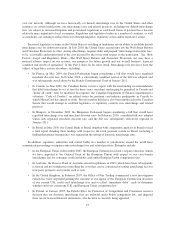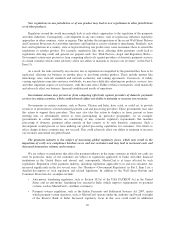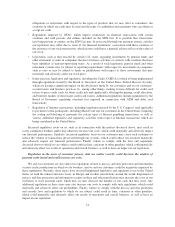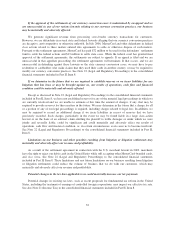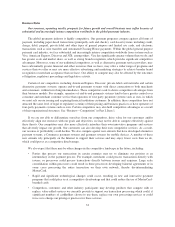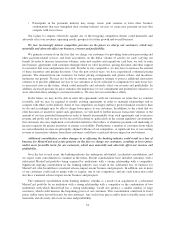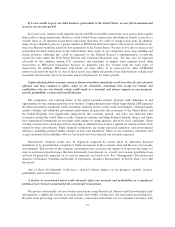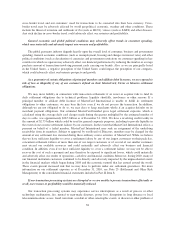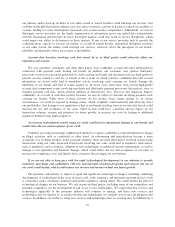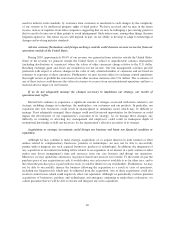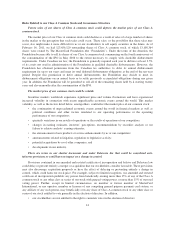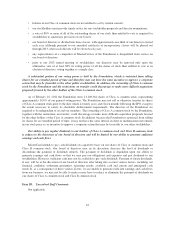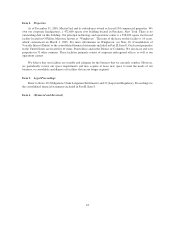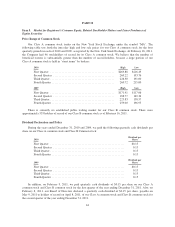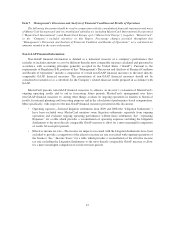MasterCard 2010 Annual Report Download - page 47
Download and view the complete annual report
Please find page 47 of the 2010 MasterCard annual report below. You can navigate through the pages in the report by either clicking on the pages listed below, or by using the keyword search tool below to find specific information within the annual report.If we are unable to grow our debit business, particularly in the United States, we may fail to maintain and
increase our revenue growth.
In recent years, industry-wide signature-based and PIN-based debit transactions have grown more rapidly
than credit or charge transactions. However, in the United States, transactions involving our brands account for a
smaller share of all signature-based debit transactions than they do credit or charge transactions. In addition,
many of our competitors process a greater number of PIN-based debit transactions at the point of sale than we do,
since our Maestro brand has relatively low penetration in the United States. We may not be able to increase our
penetration for debit transactions in the United States since many of our competitors have long-standing and
strong positions (although this could be impacted by the Federal Reserve’s implementation of network
exclusivity rules under the Wall Street Reform and Consumer Protection Act). We may also be impacted
adversely by the tendency among U.S. consumers and merchants to migrate from signature-based debit
transactions to PIN-based transactions because we generally earn less revenue from the latter types of
transactions. In addition, PIN-based transactions are more likely to be processed by other ATM/debit
point-of-sale networks than by us. Any of these factors may inhibit the growth of our debit business, which could
materially and adversely affect our revenues and overall prospects for future growth.
Unprecedented global economic events in financial markets around the world have directly and adversely
affected, and may continue to affect, many of our customers, merchants that accept our brands and
cardholders who use our brands, which could result in a material and adverse impact on our prospects,
growth, profitability, revenue and overall business.
The competitive and evolving nature of the global payments industry provides both challenges to and
opportunities for the continued growth of our business. Unprecedented events which began during 2008 impacted
the financial markets around the world, including continued distress in the credit environment, continued equity
market volatility and additional government intervention. In particular, the economies of the United States and
the United Kingdom were significantly impacted by this economic turmoil, and it has also impacted other
economies around the world. More recently, European countries including Portugal, Ireland, Greece and Spain
have experienced downgrades in sovereign credit ratings by rating agencies, driven by fiscal challenges. Some
existing customers have been placed in receivership or administration or have a significant amount of their stock
owned by their governments. Many financial institutions are facing increased regulatory and governmental
influence, including potential further changes in laws and regulations. Many of our customers, merchants that
accept our brands and cardholders who use our brands have been directly and adversely impacted.
MasterCard’s financial results may be negatively impacted by actions taken by individual financial
institutions or by governmental or regulatory bodies in response to the economic crisis and the state of economic
environments. The severity of the economic environment may accelerate the timing of or increase the impact of
risks to our financial performance that have historically been present. As a result, our revenue growth has been
and may be negatively impacted, or we may be impacted, in several ways. See “Management’s Discussion and
Analysis of Financial Condition and Results of Operations—Business Environment” in Part II, Item 7 for a full
discussion.
Any of these developments could have a material adverse impact on our prospects, growth, revenue,
profitability and overall business.
A decline in cross-border travel could adversely affect our revenues and profitability, as a significant
portion of our revenue is generated from cross-border transactions.
We process substantially all cross-border transactions using MasterCard, Maestro and Cirrus-branded cards
and generate a significant amount of revenue from cross-border volume fees and transaction processing fees.
Revenue from processing cross-border and currency conversion transactions for our customers fluctuates with
37


